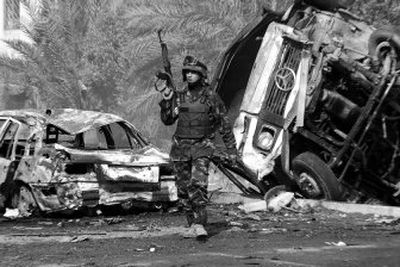37 die in Baghdad as crackdown readied

BAGHDAD, Iraq – Bombs and mortar shells killed more than 37 people in Baghdad on Monday, as U.S. officials said that the command structure for the new security crackdown in the capital was ready.
In the deadliest attack, a small truck rigged with explosives was detonated near a gas station in the Bayya neighborhood, killing 15 people and wounding 58, according to Col. Fakher Hussein of the Interior Ministry. A car bomb that exploded in an industrial area of central Baghdad killed 13 people, he said.
The U.S. and Iraqi militaries have for months been preparing a massive security initiative aimed at quelling the daily killing in the capital. A spokeswoman for the U.S. military, Lt. Col. Josslyn Aberle, said Monday that the command structure and personnel leading the effort have now been established.
Iraqi forces in the capital will be led by Lt. Gen. Abboud Gambar, a former naval commander in the military of deposed president Saddam Hussein. Gambar was taken prisoner by U.S. forces during the 1991 Persian Gulf War.
A Shiite from the southern city of Amarah, he will report directly to Prime Minister Nouri al-Maliki, whose viability as Iraq’s leader hinges on his ability to temper the violence in Baghdad.
The selection of Gambar, a relatively unknown officer, was greeted with skepticism by some Iraqi and U.S. officials. But an aide to al-Maliki said the prime minister remains confident in his choice and that Gambar has the support of coalition commanders. During a meeting last month between al-Maliki and the senior British general in Iraq, Lt. Gen. Graeme Lamb, Lamb pronounced Gambar a “good man,” the aide said.
Gambar will have deputies in charge of the east and west sides of Baghdad, which is divided by the Tigris River, and will oversee the nine security districts recently established in the capital. President Bush has pledged an additional 21,500 troops to Iraq, and thousands of them have already arrived in Baghdad.
The troop increase “changes the dynamic by adding an air of confidence to operations that we do in conjunction” with Iraqi forces, said Maj. Clay Padgett, acting commander of the 1st Battalion, 26th Infantry Regiment, a task force that patrols northeastern Baghdad.
“Quite frankly, we have had difficulties with areas inside of Baghdad that do not have a coalition forces presence. Because it’s almost like putting your finger on a dot of mercury. You hit it and it goes all over the place. And unfortunately, you didn’t have enough hands doing the same thing.”
Also on Monday, Iraqi followers of Shiite cleric Muqtada al-Sadr reacted angrily to the killings of two alleged leaders of the Mahdi Army, the powerful militia that is largely controlled by al-Sadr. One al-Sadr follower, Ali Kadhum al-Hamdani, 38, was shot dead by Iraqi soldiers, backed by U.S. advisers, during a raid on his home in the insurgent hotbed of Baqouba, in Diyala province north of Baghdad.
The U.S. military identified the dead man as a “rogue” leader of the Mahdi Army.
“The suspect is believed to have facilitated and directed numerous kidnappings, assassinations and other violence targeting Iraqi civilians and Iraqi Police. He is reportedly responsible for several attacks against Coalition and Iraqi Forces in the area,” the military said in a statement.
A spokesman for the Diyala police, Ali al-Khaiyam, said al-Hamdani was killed near his home. He owned a flower shop in the main Baqouba market and handed out candy to children to celebrate the fall of Saddam.
The second al-Sadr official, Khalil al-Maliki, from the Mahdi Army in Basra, was killed in a drive-by shooting on Sunday, according to an al-Sadr spokesman.
Abdul Razzaq al-Windawi, an al-Sadr spokesman, viewed the killings as part of an increased effort by Americans “and their agents” to target al-Sadr’s followers. The Iraqi government in the past has been widely criticized for not doing enough to target the violent followers of al-Sadr.
The U.S. military on Monday also announced the recent deaths of two U.S. soldiers. On Sunday one soldier was killed, and two others were wounded, by a roadside bomb during a patrol north of Baghdad. A soldier in Diyala province died during a small-arms attack by insurgents, the military said in a statement. Their names were not released.
At least nine other people were killed in Baghdad on Monday, at least one of them in a mortar attack, officials said.